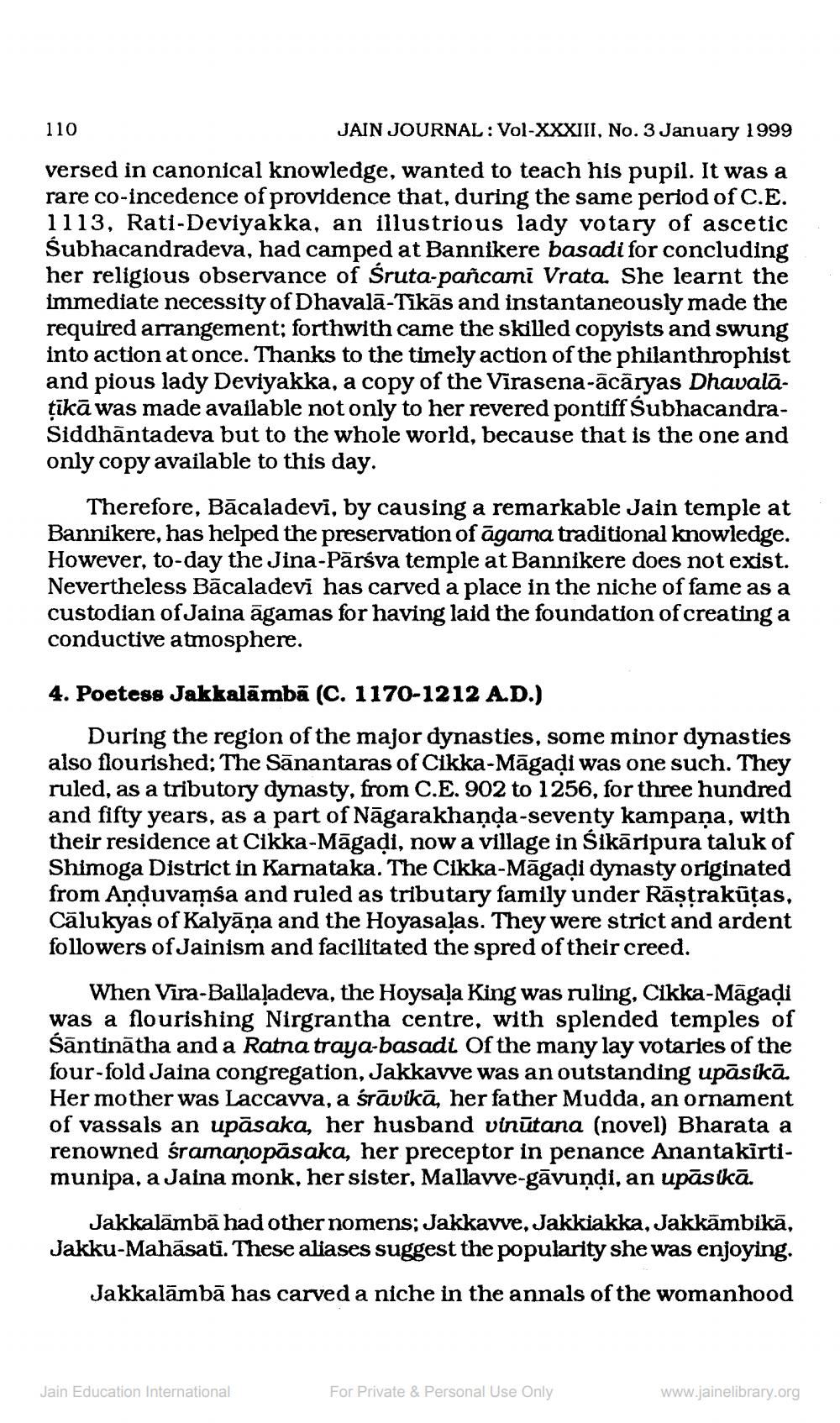________________
110
JAIN JOURNAL: Vol-XXXIII, No. 3 January 1999 versed in canonical knowledge, wanted to teach his pupil. It was a rare co-incedence of providence that, during the same period of C.E. 1113, Rati-Deviyakka, an illustrious lady votary of ascetic Subhacandradeva, had camped at Bannikere basadi for concluding her religious observance of Śruta-pañcami Vrata. She learnt the immediate necessity of Dhavala-Tikās and instantaneously made the required arrangement; forthwith came the skilled copyists and swung into action at once. Thanks to the timely action of the philanthrophist and pious lady Deviyakka, a copy of the Virasena-ācāryas Dhavalātīkā was made available not only to her revered pontiff SubhacandraSiddhāntadeva but to the whole world, because that is the one and only copy available to this day.
Therefore, Bācaladevi, by causing a remarkable Jain temple at Bannikere, has helped the preservation of agama traditional knowledge. However, to-day the Jina-Pārśva temple at Bannikere does not exist. Nevertheless Bācaladevi has carved a place in the niche of fame as a custodian of Jaina āgamas for having laid the foundation of creating a conductive atmosphere.
4. Poetess Jakkalāmbā (C. 1170-1212 A.D.)
During the region of the major dynasties, some minor dynasties also flourished; The Sānantaras of Cikka-Māgadi was one such. They ruled, as a tributory dynasty, from C.E. 902 to 1256, for three hundred and fifty years, as a part of Nāgarakhanda-seventy kampaņa, with their residence at Cikka-Māgadi, now a village in Sikāripura taluk of Shimoga District in Karnataka. The Cikka-Māgaời dynasty originated from Anļuvamsa and ruled as tributary family under Rāştrakūtas, Cālukyas of Kalyāņa and the Hoyasalas. They were strict and ardent followers of Jainism and facilitated the spred of their creed.
When Vira-Balla?adeva, the Hoysaļa King was ruling, Cikka-Māgadi was a flourishing Nirgrantha centre, with splended temples of Sāntinātha and a Ratna traya-basadi Of the many lay votaries of the four-fold Jaina congregation, Jakkavve was an outstanding upāsikā. Her mother was Laccava, a śrāvikā, her father Mudda, an ornament of vassals an upāsaka, her husband vinūtana (novel) Bharata a renowned śramanopāsaka, her preceptor in penance Anantakirtimunipa, a Jaina monk, her sister, Mallawe-gāvundi, an upāsikā.
Jakkalāmbā had other nomens; Jakkavve, Jakkiakka, Jakkambikā, Jakku-Mahāsati. These aliases suggest the popularity she was enjoying.
Jakkalāmbā has carved a niche in the annals of the womanhood
Jain Education International
For Private & Personal Use Only
www.jainelibrary.org




